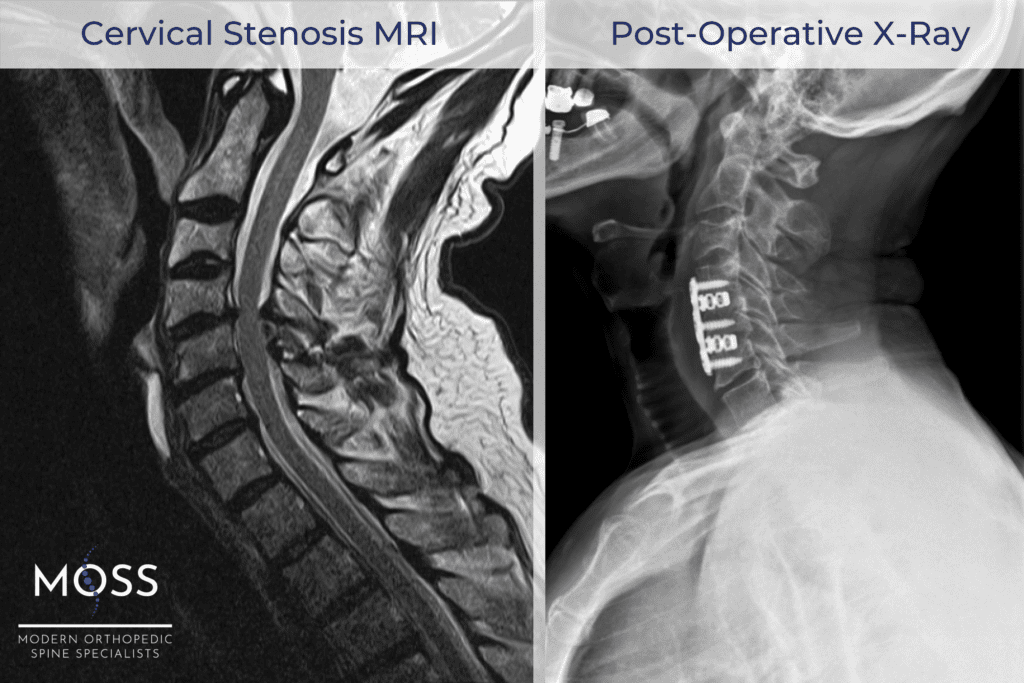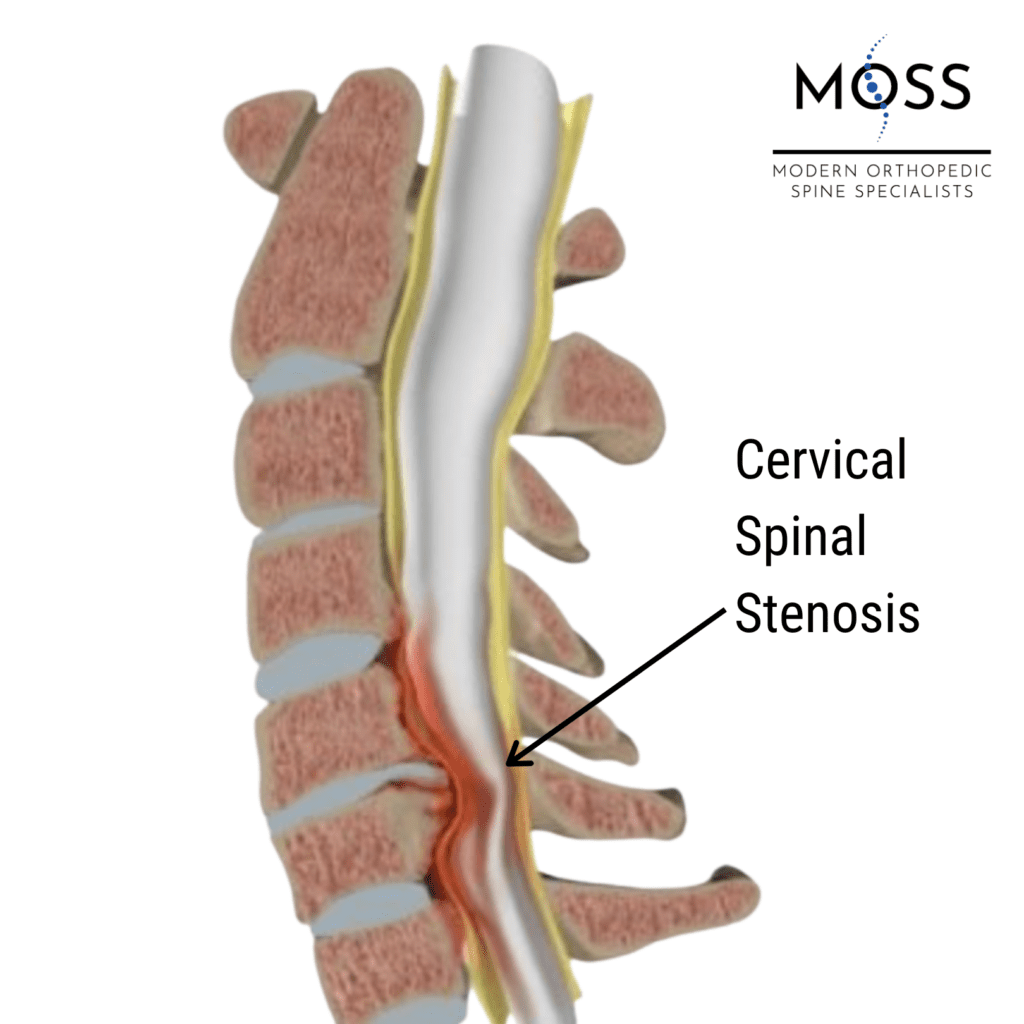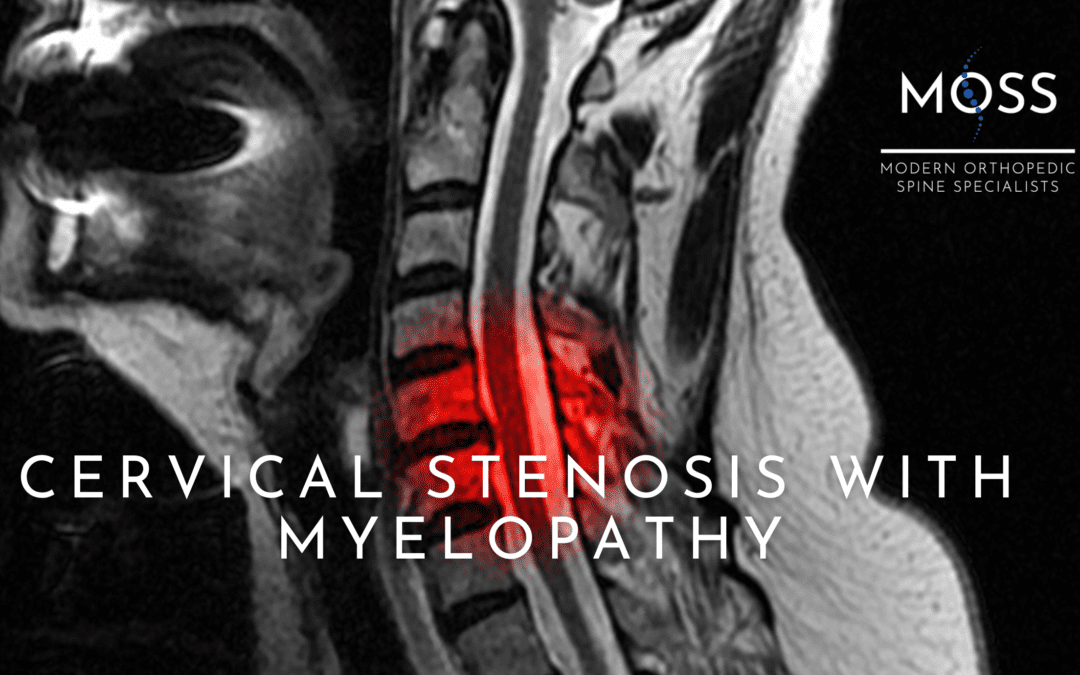Your spine does the crucial job of protecting your spinal cord which is encased within a cavity called the spinal canal. Part of the central nervous system, the spinal cord sends and receives information from the brain to and from all parts of the body. If, as a result of degeneration or injury, this canal becomes compressed, a serious condition can occur. Learn more about this dangerous condition in this post.
What is cervical stenosis?
Your spinal canal normally protects the spinal nerves traveling through it, but when it narrows because of arthritis/degeneration or various disease processes, it compresses those nerves and causes problems of varying degrees. When this occurs at the neck region of the spine, this is known as cervical spinal stenosis, or cervical stenosis.

The above-left image shows Patient A’s pre-surgery MRI, indicating a case of cervical stenosis. The image on the right is Patient A’s postoperative X-Ray.
What causes cervical spinal stenosis?
This narrowing of the spinal canal can be a slow process if caused by degenerative changes resulting from normal wear and tear and aging, but it can happen more rapidly as a result of injury to the spine or disc herniations.
Degenerative causes of cervical stenosis include:
- Osteoarthritis
- Slipped disc/vertebra also known as spondylolisthesis
- Bone spurs
- Swollen ligaments
- Disc herniations
Other causes:
- Tumors
- Injury to the spine
Those who are born with a smaller spinal canal or a congenital spinal deformity are naturally more at risk for developing cervical spinal stenosis.
What is myelopathy?
If the spinal canal narrows to the point where the spinal cord ( nerve bundle running from the base of the brain to the lower back) is compressed, a condition called myelopathy occurs.

Cervical stenosis with myelopathy can produce a variety of symptoms, depending on the location and severity of compression, but it can also be painless, making it a deceiving and dangerous condition.
Symptoms of cervical stenosis with myelopathy may include:
- Numbness or tingling (in arm, hand, leg, or foot)
- Weakness (in arm, hand, leg, or foot)
- Pain (at site of compression or in arm, hand, leg, or foot)
- Neck stiffness
- Loss of bladder or bowel control
- Problems with balance and coordination
- Loss of dexterity
- Paralysis
Symptoms of cervical stenosis with myelopathy can advance in severity and can cause permanent disability and loss of function if left untreated. It is important to seek medical help early and not wait for symptoms to progress.
Changes typically occur slowly and over time, but they can also occur suddenly and progress rapidly. Individuals with cervical stenosis and myelopathy who sustained trauma to the head and neck, can have sudden neurologic decline, like paraplegia or quadriplegia, can be seen.
What is the treatment for cervical spinal stenosis with myelopathy?
It is important to seek medical help early to prevent further damage and symptom progression. Your spinal surgeon will assess your condition, monitor your symptoms, order diagnostic testing, and make recommendations based on those findings.
If compression and symptoms are mild, your doctor may recommend pain medication, steroid injections, physical therapy, or modifying positions and activities, all under medical guidance.
However, surgery is the most reliable and surest way to address cervical stenosis with myelopathy. The goal of surgery is to relieve the compression and prevent further damage, and with minimally invasive techniques available, you can be assured of a faster recovery.
Dr. Armen Oganesian can discuss your options with you and develop a treatment plan that best suits your needs. He and his caring staff are dedicated to providing you with optimal results and minimal downtime so you can quickly return to doing those things you love most!
For an individual consultation, contact Dr. Armen Oganesian at The Modern Spine Specialists today! Please contact The Modern Spine Specialists at 805-370-0748, or email us at info@themodernspine.com.
You can also visit our office at:
250 Lombard Street
Thousand Oaks, CA 91360


Recent Comments